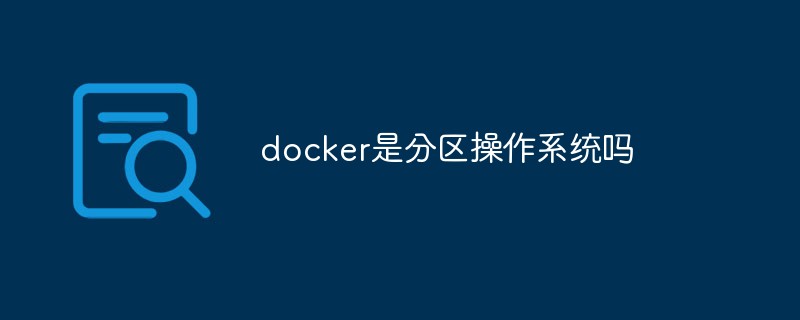
Docker is not a partitioned operating system; an operating system is a computer program that manages computer hardware and software resources, and docker refers to a docker container, an open source application container engine that can package applications and dependency packages into a reusable ported image and publish to any popular operating system machine.

The operating environment of this tutorial: linux7.3 system, docker version 19.03, Dell G3 computer.
Docker refers to the Docker container. It is an open source application container engine that allows developers to package their applications and dependency packages into a portable image, and then Publishing to machines with any popular operating system can also be virtualized.
The operating system (operating system, referred to as OS) is a computer program that manages computer hardware and software resources. The operating system needs to handle basic tasks such as managing and configuring memory, determining the priority of system resource supply and demand, controlling input and output devices, operating the network, and managing the file system. The operating system also provides an interface for users to interact with the system.
docker
Docker is an open source application container engine that allows developers to package their applications and dependencies into a portable image. Then publish to any popular Linux or Windows operating system machine, which can also be virtualized. Containers completely use the sandbox mechanism and will not have any interfaces with each other.
Docker containers are similar to virtual machines, but they are different in principle. Containers virtualize the operating system layer, and virtual machines are virtualized hardware. Therefore, containers are more portable and use servers efficiently. Containers are used more to represent a standardized unit of software. Due to the standardization of containers, it can be deployed anywhere regardless of infrastructure differences. In addition, Docker also provides containers with stronger industry isolation compatibility.
Docker uses the resource separation mechanism in the Linux core, such as cgroups, and Linux core namespaces (namespaces), to create independent containers (containers). This can operate under a single Linux entity, avoiding the additional burden of launching a virtual machine [3]. The Linux kernel's support for namespaces completely isolates the application's view of the working environment, including the process tree, network, user ID and mounted file system, while the core cgroup provides resource isolation, including CPU, memory, block I/O and network. Starting from version 0.9, Dockers began to include the libcontainer library as a direct use of the virtualization facilities provided by the Linux kernel in its own way, based on the interface provided by libvirt's LXC and systemd-nspawn,
According to industry analyst firm “451 Research”: “Dockers are dependency tools that have the ability to package applications and their virtual containers that can be executed on any Linux server, which helps achieve flexibility and portability of applications. The program can be executed anywhere, whether it is a public cloud server, a private cloud server, a stand-alone machine, etc."
operating system
The computing operating system can say something about the computer It is very important. From the user's perspective, the operating system can schedule various resource blocks of the computer system, including software and hardware equipment, data information, etc. The use of computer operating systems can reduce the intensity of manual resource allocation. The user's intervention in computing operations is reduced, and the computer's intelligent work efficiency can be greatly improved. Secondly, in terms of resource management, if multiple users jointly manage a computer system, there may be conflicts in the information sharing between the two users. In order to more reasonably allocate the various resource blocks of the computer and coordinate the various components of the computer system, it is necessary to give full play to the functions of the computer operating system and make optimal adjustments to the efficiency and degree of use of each resource block so that each user can All needs can be met. Finally, with the assistance of computer programs, the operating system can abstractly handle various basic functions provided by computing system resources, display operating system functions to users in a visual way, and reduce the difficulty of using the computer.
The operating system mainly includes the following functions:
Process management, its work is mainly process scheduling. In the case of a single user and a single task, the processor Only one task for one user is exclusive, and the work of process management is very simple. However, in the case of multi-programming or multi-user, when organizing multiple jobs or tasks, it is necessary to solve the problems of processor scheduling, allocation and recycling.
Storage management is divided into several functions: storage allocation, storage sharing, storage protection, and storage expansion.
Device management has the following functions: device allocation, device transmission control, and device independence.
File management: file storage space management, directory management, file operation management, and file protection.
Job Management is responsible for processing any requests submitted by users.
Recommended learning: "docker video tutorial"
The above is the detailed content of Is docker a partitioned operating system?. For more information, please follow other related articles on the PHP Chinese website!
 The difference between k8s and docker
The difference between k8s and docker
 What are the methods for docker to enter the container?
What are the methods for docker to enter the container?
 What should I do if the docker container cannot access the external network?
What should I do if the docker container cannot access the external network?
 What is the use of docker image?
What is the use of docker image?
 How to withdraw cash from Yiouokex
How to withdraw cash from Yiouokex
 Solution to slow access speed when renting a US server
Solution to slow access speed when renting a US server
 Virtual currency exchange platform
Virtual currency exchange platform
 Introduction to the opening location of win8 running
Introduction to the opening location of win8 running